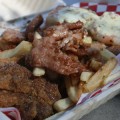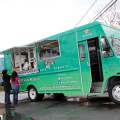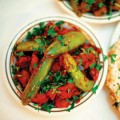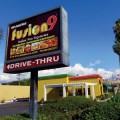Silicon Valley Salvadoran restaurants are few in number, so Salvadoran food remains a relatively unknown cuisine in this area. Mexican food dominates the valley, and all other south-of-border cuisines must deal with it.
San Jose’s La Costa del Sol probably knows this. The restaurant is located way down on Monterey Road, a gold mine of diners, Vietnamese food and cheap Mexican joints. That’s probably why the restaurant’s menu is split between Salvadoran and Mexican food.
Silicon Valley Salvadoran restaurants are few in number, so Salvadoran food remains a relatively unknown cuisine in this area. Mexican food dominates the valley, and all other south-of-border cuisines must deal with it.
San Jose’s La Costa del Sol probably knows this. The restaurant is located way down on Monterey Road, a gold mine of diners, Vietnamese food and cheap Mexican joints. That’s probably why the restaurant’s menu is split between Salvadoran and Mexican food.
Salvadoran food is what they specialize in, but to cover their bets they’ve also got the full lineup of tacos, burritos and enchiladas. But it’s the Salvadoran food that stands out here. Salvadoran food isn’t like Mexican food at all. It’s not spicy and is rather simple and straightforward where Mexican food can be quite complex. This is Central American soul food—pan-fried steak and chicken with lots of onion, hearty meat and vegetable soups, fried pork and yucca and, of course, pupusas.
Pupusas are to El Salvador what hot dogs and hamburgers are to the United States, a cheap and easy-to-make snack for people on the run. A pupusa is a masa griddle cake filled with cheese, meat, beans and other tasty things.
La Costa del Sol’s pupusas ($2.25) are quite good. While I couldn’t hear the telltale slap-slap of someone in the kitchen forming them by hand, I knew they were made to order. The masa was wonderfully moist and crisp on the outside. I ordered the bean and cheese pupusas, and I loved how the cheese oozed out and frizzled up on the edges.
The classic pupusa accompaniments are tomato salsa and curtido, a vinegary cabbage slaw seasoned with oregano. The salsa is mild, but combined with the curtido, the acidic bite of both cuts the fried richness of the pupusas. Pollo encebollado ($7.95) is a deceptively simple but delicious dish. Fat chicken breasts are pan fried with onions in a buttery, tangy sauce. Another Salvadoran standard worth seeking out is the panes rellenos ($5.95), big French rolls stuffed with sliced turkey and salsa.
The one dish that missed was the yucca con chicharron ($5.99). The pork was tough and dry and hard to eat. The starchy yucca was good though, especially when sprinkled with a squeeze of lemon juice.
As good as the Salvadoran food can be here, one Mexican dish caught my attention: chicken tinga. Offered as a special ($6.95) on one of my visits, this seldom-seen dish of moist, chipotle-braised chicken piled atop a crisp corn tortilla was great. I had to deduct points, however, for the nonregulation cheddar cheese sprinkled on top. That’s not the Mexican way. But if it’s offered as a special, it’s still worth ordering.
Horchata Salvadoreño ($1.65 for small) differs from the sweeter, cinnamon-laced Mexican version. The drink is made with toasted rice, peanuts, cacao, sesame seeds and morro seeds, a unique Salvadoran ingredient. It’s delicious. For dessert and a real taste of El Salvador, chilate con nuegados ($5.95) is a hearty but simple local specialty. Chilate is masa mixed with hot water into a thick, pasty drink. (In Mexico it’s called atole.) On its own, it is quite bland, but the idea is to eat it with the nuegados (sweetened fried yucca and cinnamon-spiked, syrup-steeped plantains). I confess, I didn’t drink much of the chilate, but the nuegados are pretty good, if a bit greasy. Think of them as Salvadoran donuts.
La Costa del Sol
2951 Monterey Road, San Jose
Daily for lunch and dinner
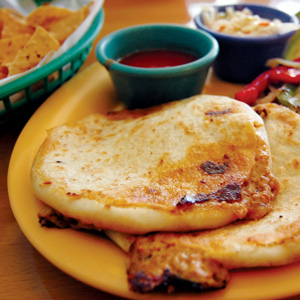
 Marché‘s Adrienne Garcia
Marché‘s Adrienne Garcia 